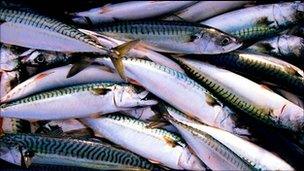EU signals mackerel ban for Iceland ahead of more talks
- Published

Iceland claims more than one million tonnes of mackerel migrated into its economic zone
The European Union has signalled an intention to block landings of mackerel from Icelandic boats amid the ongoing quota dispute.
The wrangle over increased quotas has caused anger and concern within the Scottish industry for several months.
Talks had failed to resolve the issue, after Iceland unilaterally increased its quotas following a surge of mackerel in its territory.
It is hoped any block could yet be averted through more talks.
Tomas Heidar, chief negotiator for Iceland on mackerel fisheries, told the BBC Scotland news website it was "imperative" to "reach an agreement on comprehensive management of the mackerel stock in order to ensure sustainable fishery".
He added: "We emphasise that all the parties carry joint responsibility in this regard."
The European Commission said in a statement: "The EU and Iceland have a serious disagreement on the management of a fish stock of mutual interest, namely mackerel.
"Traditionally this stock was managed by the EU and Norway but Icelandic fisheries developed very rapidly in 2008 and 2009 in an unrestricted manner.
"The Icelandic government started to put ceilings on these catches in 2009, but at too high levels."
The statement added: "Iceland expressed its willingness to resume the consultations.
"The EU welcomed the positive signals from Iceland and looked forward to the early resumption for a mutual satisfactory conclusion of the negotiations."
Fisheries Secretary Richard Lochhead said: "I'm pleased that the European Commission has signalled its intent to take forward swift action against Iceland if required.
"I welcome Iceland's indication that they are willing to resume talks and hope that they will come back to the table as a matter of urgency."
Latest twist
Mackerel is the Scottish fleet's most valuable stock and fishing leaders had said the row was likely to escalate unless action was taken.
Last month, Iceland announced it was setting a 2011 quota of 146,818 tonnes, up from 130,000 in 2010.
That was the latest twist in the dispute that placed it and the Faroe Islands, which also increased its quota last year, at odds with the European Union and Norway.
The Faroes would not be covered by any ban because it has not yet set quotas for this year.
Iceland's negotiators have said the country's fleet would have enough capacity to land its catch in Iceland, therefore sanctions would not make a difference.
- Published14 January 2011
- Published3 January 2011
- Published18 December 2010
- Published14 December 2010
- Published10 December 2010